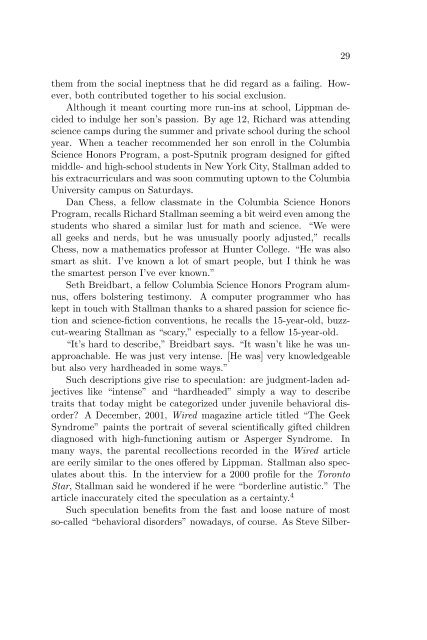Create successful ePaper yourself
Turn your PDF publications into a flip-book with our unique Google optimized e-Paper software.
them from the social ineptness that he did regard as a failing. However,<br />
both contributed together to his social exclusion.<br />
Although it meant courting more run-ins at school, Lippman decided<br />
to indulge her son’s passion. By age 12, Richard was attending<br />
science camps during the summer and private school during the school<br />
year. When a teacher recommended her son enroll in the Columbia<br />
Science Honors Program, a post-Sputnik program designed for gifted<br />
middle- and high-school students in New York City, Stallman added to<br />
his extracurriculars and was soon commuting uptown to the Columbia<br />
University campus on Saturdays.<br />
Dan Chess, a fellow classmate in the Columbia Science Honors<br />
Program, recalls Richard Stallman seeming a bit weird even among the<br />
students who shared a similar lust for math and science. “We were<br />
all geeks and nerds, but he was unusually poorly adjusted,” recalls<br />
Chess, now a mathematics professor at Hunter College. “He was also<br />
smart as shit. I’ve known a lot of smart people, but I think he was<br />
the smartest person I’ve ever known.”<br />
Seth Breidbart, a fellow Columbia Science Honors Program alumnus,<br />
offers bolstering testimony. A computer programmer who has<br />
kept in touch with Stallman thanks to a shared passion for science fiction<br />
and science-fiction conventions, he recalls the 15-year-old, buzzcut-wearing<br />
Stallman as “scary,” especially to a fellow 15-year-old.<br />
“It’s hard to describe,” Breidbart says. “It wasn’t like he was unapproachable.<br />
He was just very intense. [He was] very knowledgeable<br />
but also very hardheaded in some ways.”<br />
Such descriptions give rise to speculation: are judgment-laden adjectives<br />
like “intense” and “hardheaded” simply a way to describe<br />
traits that today might be categorized under juvenile behavioral disorder?<br />
A December, 2001, Wired magazine article titled “The Geek<br />
Syndrome” paints the portrait of several scientifically gifted children<br />
diagnosed with high-functioning autism or Asperger Syndrome. In<br />
many ways, the parental recollections recorded in the Wired article<br />
are eerily similar to the ones offered by Lippman. Stallman also speculates<br />
about this. In the interview for a 2000 profile for the Toronto<br />
Star, Stallman said he wondered if he were “borderline autistic.” The<br />
article inaccurately cited the speculation as a certainty. 4<br />
Such speculation benefits from the fast and loose nature of most<br />
so-called “behavioral disorders” nowadays, of course. As Steve Silber-<br />
29


